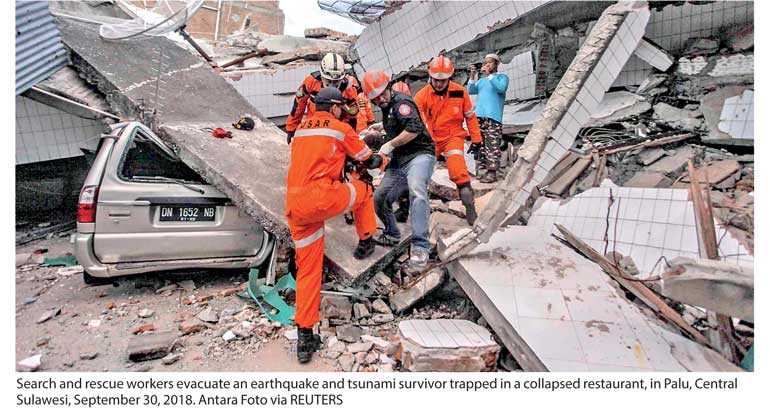Wednesday Feb 25, 2026
Wednesday Feb 25, 2026
Wednesday, 3 October 2018 00:00 - - {{hitsCtrl.values.hits}}
 PALU, Indonesia (Reuters): Indonesian President Joko Widodo called for reinforcements in a desperate search for survivors of a devastating earthquake and tsunami on Sulawesi island, as the official death toll rose above 1,200 on Tuesday and looting fuelled fears of lawlessness.
PALU, Indonesia (Reuters): Indonesian President Joko Widodo called for reinforcements in a desperate search for survivors of a devastating earthquake and tsunami on Sulawesi island, as the official death toll rose above 1,200 on Tuesday and looting fuelled fears of lawlessness.
Officials fear the toll could soar, as most of the confirmed dead had come from Palu, a small city 1,500 km (930 miles) northeast of Jakarta, while some remote areas have been cut off since Friday’s 7.5 magnitude quake triggered tsunami waves.
“There are some main priorities that we must tackle and the first is to evacuate, find and save victims who’ve not yet been found,” Widodo told a government meeting to coordinate disaster recovery efforts on the west coast of Sulawesi.
He said he had ordered the national search and rescue agency to send more police and soldiers into the affected districts, some cut off by destroyed roads, landslides and downed bridges.
The official death toll surged to 1,234, the national disaster agency said. Nearly 800 were seriously injured.
The Red Cross said the situation was “nightmarish” and reports from its workers venturing into one cut-off area, Donggala, a region of 300,000 people north of Palu and close to the epicentre, indicated it had been hit “extremely hard”.
A video of Donggala, broadcast by the Antara state news agency, showed widespread destruction, including flattened buildings and a ship that had been hurled into port buildings by the tsunami.
“What we need is food, water, medicine, but to up now we’ve got nothing,” said an unidentified man standing in ruins.
Four badly hit districts of Sulawesi, one of the archipelago nations five main islands, have a combined population of about 1.4 million.
In Palu, tsunami waves as high as six metres (20 feet) smashed into the beachfront, while hotels and shopping malls collapsed in ruins. Some neighbourhoods were swallowed up by ground liquefaction, which happens when soil shaken by an earthquake behaves like a liquid.
About 1,700 houses in one neighbourhood have disappeared beneath the mud, with hundreds of people believed buried, the national disaster agency said.
Before-and-after satellite pictures show a largely built-up neighbourhood just south of Palu’s airport seemingly wiped clean of all signs of life by liquefaction.
Among those killed were 34 children at a Christian bible study camp, a Red Cross official said.
More than 65,000 homes were damaged and more than 60,000 people have been displaced and are in need of emergency help.
Thousands of people have been streaming out of stricken areas. Commercial airlines have struggled to restore operations at Palu’s damaged airport but military aircraft have taken some survivors out. Many more want to leave.
Authorities have said a navy vessel capable of taking 1,000 people at a time would help with the evacuation.
The government has ordered aid supplies to be airlifted in but there’s little sign of help on Palu’s shattered streets and survivors appeared increasingly desperate.
A Reuters news team saw a shop cleared by about 100 people, shouting, scrambling and fighting each other for items including clothes, toiletries, blankets and water.
Many people grabbed diapers while one man clutched a rice cooker as he headed for the door. Non-essential goods were scattered on the floor amid shards of broken glass.
At least 20 police were at the scene but did not intervene. The government has played down fears of looting saying disaster victims could take essential goods and shops would be compensated later.
Indonesia is all too familiar with earthquakes and tsunamis. A quake in 2004 triggered a tsunami across the Indian Ocean that killed 226,000 people in 13 countries, including more than 120,000 in Indonesia.
It has said it would accept offers of international aid, having shunned outside help earlier this year when an earthquake struck the island of Lombok.
State port operator Pelindo IV said a ship carrying 50 tonnes of supplies including rice, eggs, noodles, mineral water and baby milk had arrived in Palu on Monday. It was unclear if the aid had been distributed. Power has yet to be restored and aftershocks have rattled jangled nerves. But rescuers in Palu held out hope they could still save lives.
“We suspect there are still some survivors trapped inside,” the head of one rescue team, Agus Haryono, told Reuters at the collapsed seven-storey Hotel Roa Roa as he pored over its blueprints.
About 50 people were believed to have been caught inside the hotel when it was brought down. About nine bodies have been recovered from the ruins and three rescued alive.
Elsewhere, on the outskirts of Palu, lorries brought 54 bodies to a mass grave dug in sandy soil.
Most of the bodies had not been claimed, a policeman said, but some relatives came to pay respects to loved ones at the 50-metre (165 ft) trench.
Rosmawati Binti Yahya, 52, was still looking for her missing daughter. But her husband was among the victims laid in the grave.
“It’s OK if he’s buried in the mass grave, it’s better to have him buried fast,” she said, as the stench from decomposing bodies filled the air.